
04/06/2011
Movies Home / Entertainment Channel / Bullz-Eye Home
When screenwriter Paul Schrader heard about the attempted 1981 assassination of Ronald Reagan by John David Hinckley, his first thought was that the perpetrator was "one of those 'Taxi Driver' kids." He was more right than he could have possibly realized. What Schrader couldn't know at the time was how many other "'Taxi Driver' kids" would eventually find their way onto the big screen.
As the fully restored Blu-ray version of "Taxi Driver" makes clear, the classic collaboration between Schrader, director Martin Scorsese, and actor Robert De Niro remains a suspenseful, shocking, and beautiful film 35 years after its first release. A terrifying and affecting story of a sometimes sympathetic half-mad human time bomb who explodes with highly ironic consequences, its resonances with real life are all too obvious. Its protagonist was also a genuine first.
We could rattle off a long list of crooks, serial killers, alienated war veterans, and misfits of all sorts who appeared in classic films prior to 1976 – many of them cited specifically by Schrader and Scorsese – but none of these characters has the same mixture of pathology and misguided heroism as Travis Bickle. Schrader, Scorsese and De Niro took the preexisting DNA of real and fictional lunatics and monsters of all sorts, combined it with very personal concerns, and created a genuinely viable movie mutation: the utterly misguided, spiritually adrift, borderline psychotic on a bloody and senseless mission of redemption.
Below are some of the many film protagonists we feel certain might never have been created if Travis Bickle and "Taxi Driver" had not come first. You may notice that the great majority of them seem to have been made since 2003 or so. That isn't so reassuring.
Rupert Pupkin of "The King of Comedy" (1982)
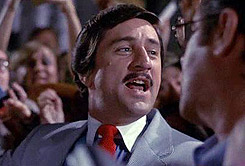 Also starring Robert De Niro and directed by Martin Scorsese, writer Paul D. Zimmerman's brilliant script for "The King of Comedy" largely repeats the tragedy of "Taxi Driver" as dark show business farce. With ridiculously slicked-back hair and a criminally inane mustache, Rupert Pupkin (De Niro) is well into his 30s and his show business plans have not progressed past the point of putting on imaginary shows in his mom's basement. His coping skills in dealing with the inevitable rejections of a stand-up career show a similar level of maturity, and so Rupert kidnaps his idol, the reigning king of TV late night (Jerry Lewis at his most cynical), to try and ransom his way into the hearts of comedy fans. Now, Pupkin is more of an obvious ultra-dweeb social outcast than Bickle, but subjecting a celebrity to kidnapping and light torture certainly qualifies him in the dangerous lunacy department. As reality TV regularly reminds us, however, Pupkin's pathological obsession with fame at all costs is more commonplace than Bickle's bloodier desires. In theory, it should be a less disturbing movie than "Taxi Driver," but "The King of Comedy" scared away theatrical audiences. It may be that, for all Bickle's violence, it's the more familiar, media-saturated Rupert Pupkin who really creeps us out.
Also starring Robert De Niro and directed by Martin Scorsese, writer Paul D. Zimmerman's brilliant script for "The King of Comedy" largely repeats the tragedy of "Taxi Driver" as dark show business farce. With ridiculously slicked-back hair and a criminally inane mustache, Rupert Pupkin (De Niro) is well into his 30s and his show business plans have not progressed past the point of putting on imaginary shows in his mom's basement. His coping skills in dealing with the inevitable rejections of a stand-up career show a similar level of maturity, and so Rupert kidnaps his idol, the reigning king of TV late night (Jerry Lewis at his most cynical), to try and ransom his way into the hearts of comedy fans. Now, Pupkin is more of an obvious ultra-dweeb social outcast than Bickle, but subjecting a celebrity to kidnapping and light torture certainly qualifies him in the dangerous lunacy department. As reality TV regularly reminds us, however, Pupkin's pathological obsession with fame at all costs is more commonplace than Bickle's bloodier desires. In theory, it should be a less disturbing movie than "Taxi Driver," but "The King of Comedy" scared away theatrical audiences. It may be that, for all Bickle's violence, it's the more familiar, media-saturated Rupert Pupkin who really creeps us out.
William "D-Fens" Foster of "Falling Down" (1993)
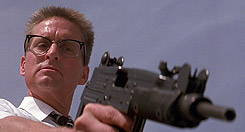 The "Taxi Driver" ethos goes mainstream in this odd and awkward zeitgeist-riding hit from writer Ebbe Roe Smith and director Joel Schumacher. Named for his personalized license plate, "D-Fens" (Michael Douglas) is a defense industry engineer for whom the post-Cold War "peace dividend" pays off with a firing and a divorce. The embodiment of unfashionable white male urban frustration with short-sleeved shirt and tie, nerd-style glasses and quasi-military haircut, D-Fens starts his day by abandoning his car on a jammed freeway interchange. This West Coast Bickle spends the balance of his odyssey traveling on foot from what's supposed to be South Central L.A. (never mind those Santa Monica buses that keep coming into frame), wreaking racially charged havoc at a liquor store, blowing stuff up, and later stopping at a Culver City army surplus store to murder a violent neo-Nazi (Frederic Forrest), before finally moving on to the Venice Pier for a terrifying encounter with his ex-wife and young daughter (Barbara Hershey and Joey Hope Singer). D-Fens differs from Bickle in that his creators want us to kind of love him. In an attempt at complexity, he spends half the film as a folk hero everyman, and the other half as a delusional psychotic driven mad by forces supposedly beyond his control. D-Fens might be the man Travis Bickle believes himself to be: an almost-hero gone wrong. The only problem is he's no hero at all, just an extremely well-acted character in a hollow Hollywood movie.
The "Taxi Driver" ethos goes mainstream in this odd and awkward zeitgeist-riding hit from writer Ebbe Roe Smith and director Joel Schumacher. Named for his personalized license plate, "D-Fens" (Michael Douglas) is a defense industry engineer for whom the post-Cold War "peace dividend" pays off with a firing and a divorce. The embodiment of unfashionable white male urban frustration with short-sleeved shirt and tie, nerd-style glasses and quasi-military haircut, D-Fens starts his day by abandoning his car on a jammed freeway interchange. This West Coast Bickle spends the balance of his odyssey traveling on foot from what's supposed to be South Central L.A. (never mind those Santa Monica buses that keep coming into frame), wreaking racially charged havoc at a liquor store, blowing stuff up, and later stopping at a Culver City army surplus store to murder a violent neo-Nazi (Frederic Forrest), before finally moving on to the Venice Pier for a terrifying encounter with his ex-wife and young daughter (Barbara Hershey and Joey Hope Singer). D-Fens differs from Bickle in that his creators want us to kind of love him. In an attempt at complexity, he spends half the film as a folk hero everyman, and the other half as a delusional psychotic driven mad by forces supposedly beyond his control. D-Fens might be the man Travis Bickle believes himself to be: an almost-hero gone wrong. The only problem is he's no hero at all, just an extremely well-acted character in a hollow Hollywood movie.
Byeong-gu of "Save the Green Planet" (2003)
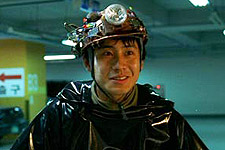 There's something very American about Travis Bickle's pathology, but perhaps there's also something extremely South Korean about it. Partially inspired by 1990's "Misery" and an insane anti-Leonardo DiCaprio conspiracy website, writer-director Jang Jun-hwan's rather brilliant genre-Cuisinart movie is far more like "The King of Comedy" mixed with "2001: A Space Odyssey" and "Psycho," only funnier, sadder, and with much more torture. As played by Shin Ha-kyun ("Sympathy for Mr. Vengeance"), Byeong-gu kidnaps and physically torments a powerful industrialist (Baek Yoon-sik) in ways that Rupert Pupkin could scarcely imagine, all with a little help from the adoring Su-ni (Hwang Jeong-min), a zaftig acrobat. Why? He's convinced that his captive is actually part of a secret alien invasion. Though he's kind of a sweet guy when he's not torturing people to death, the question isn't whether or not Byeong-gu is insane. He very clearly is, but how did he get that way? As its title suggests, "Save the Green Planet" is a more overtly political film than others in the post-Bickle subgenre, suggesting that we may really have evil forces within our society as frightening as any alien invader. It's also different in that it actually allows us to sympathize with this nut. For all the nasty tortures he inflicts on his angry victim, it's not really sadism that motivates him, but desperation and the conviction that his planet is in grave danger and doing these evil acts might somehow redeem it. As it turns out, he's only half wrong.
There's something very American about Travis Bickle's pathology, but perhaps there's also something extremely South Korean about it. Partially inspired by 1990's "Misery" and an insane anti-Leonardo DiCaprio conspiracy website, writer-director Jang Jun-hwan's rather brilliant genre-Cuisinart movie is far more like "The King of Comedy" mixed with "2001: A Space Odyssey" and "Psycho," only funnier, sadder, and with much more torture. As played by Shin Ha-kyun ("Sympathy for Mr. Vengeance"), Byeong-gu kidnaps and physically torments a powerful industrialist (Baek Yoon-sik) in ways that Rupert Pupkin could scarcely imagine, all with a little help from the adoring Su-ni (Hwang Jeong-min), a zaftig acrobat. Why? He's convinced that his captive is actually part of a secret alien invasion. Though he's kind of a sweet guy when he's not torturing people to death, the question isn't whether or not Byeong-gu is insane. He very clearly is, but how did he get that way? As its title suggests, "Save the Green Planet" is a more overtly political film than others in the post-Bickle subgenre, suggesting that we may really have evil forces within our society as frightening as any alien invader. It's also different in that it actually allows us to sympathize with this nut. For all the nasty tortures he inflicts on his angry victim, it's not really sadism that motivates him, but desperation and the conviction that his planet is in grave danger and doing these evil acts might somehow redeem it. As it turns out, he's only half wrong.
Samuel J. Bicke of "The Assassination of Richard Nixon" (2004)
 Set in 1974, this highly serious, intense, and intensely pleasure-free drama from director Niels Mueller is inspired by real incidents that prove "Taxi Driver" was both fiction and a kind of reportage. It depicts the ever-downward psychological spiral of Sam Bicke, a self-destructive furniture salesman (Sean Penn). A family man separated from his children, he remains dangerously obsessed with his ex-wife (Naomi Watts), estranged from his orthodox Jewish brother (Michael Wincott), and infatuated with the radical agenda of the Black Panthers. The salesmanship platitudes of Dale Carnegie that his venal boss (Jack Thompson) forces on him only deepens the failure's anger, and Bicke's only safety valve is a level-headed mechanic (Don Cheadle) who somehow remains his friend despite his disturbing behavior. Bicke is nearly as much a relative of Willy "Death of a Salesman" Loman and Shelly "Glengarry Glen Ross" Levine as Travis Bickle, but his pathology turns out to be potentially far more deadly. Even so, it's tempting to feel a little bit of sympathy for Bicke because of his refusal to lie and his dislike of the predatory dishonesty embodied by the public image of President Nixon at the height of the Watergate scandal. Of course, Bicke's attempt to hijack a plane and crash it into the White House is as evil as any Al-Qaeda plot and, fortunately, just as poorly planned as their more recent escapades. On the other hand, what is Al-Qaeda really other than a semi-organized group of Islamist Sam Bickes and Travis Bickles?
Set in 1974, this highly serious, intense, and intensely pleasure-free drama from director Niels Mueller is inspired by real incidents that prove "Taxi Driver" was both fiction and a kind of reportage. It depicts the ever-downward psychological spiral of Sam Bicke, a self-destructive furniture salesman (Sean Penn). A family man separated from his children, he remains dangerously obsessed with his ex-wife (Naomi Watts), estranged from his orthodox Jewish brother (Michael Wincott), and infatuated with the radical agenda of the Black Panthers. The salesmanship platitudes of Dale Carnegie that his venal boss (Jack Thompson) forces on him only deepens the failure's anger, and Bicke's only safety valve is a level-headed mechanic (Don Cheadle) who somehow remains his friend despite his disturbing behavior. Bicke is nearly as much a relative of Willy "Death of a Salesman" Loman and Shelly "Glengarry Glen Ross" Levine as Travis Bickle, but his pathology turns out to be potentially far more deadly. Even so, it's tempting to feel a little bit of sympathy for Bicke because of his refusal to lie and his dislike of the predatory dishonesty embodied by the public image of President Nixon at the height of the Watergate scandal. Of course, Bicke's attempt to hijack a plane and crash it into the White House is as evil as any Al-Qaeda plot and, fortunately, just as poorly planned as their more recent escapades. On the other hand, what is Al-Qaeda really other than a semi-organized group of Islamist Sam Bickes and Travis Bickles?
Mark David Chapman of "Chapter 27" (2008)
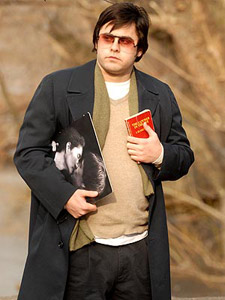 This is by no means a good film, and there's no particular reason to think it's an accurate rendering of hours leading up to the senseless 1980 murder of John Lennon. Nevertheless, the lingering influence of "Taxi Driver" is so strong in its depiction of its obsessive and delusional protagonist that we can't ignore it here. Clearly actor Jared Leto and writer-director J.P. Schaefer had De Niro, Scorsese and Schrader in mind. Schaefer borrows numerous images from "Taxi Driver" and his film pays homage to their later collaboration, "Raging Bull," at least in terms of Leto's potentially self-destructive weight gain to better resemble the overweight Chapman. Chapman's main issue was not, of course, 60-70 unsightly pounds any more than it was the odd Southern accent Leto struggles with throughout the film. Chapman was an obsessive Beatles fan and lunatic who believed that J.D. Salinger's The Catcher in the Rye was instructing him to assassinate his musical hero for reasons we couldn't begin to explain. The movie substitutes a lot of meandering narration and creepy random encounters for some kind of exploration of Chapman's psyche, but none of it registers. One thing J.P. Schaefer's movie proves, however, is that it takes more than endless repeated images of a shirtless Leto posing with his gun in front of a mirror while talking to himself to recreate the chilling insanity and sadness of a Travis Bickle.
This is by no means a good film, and there's no particular reason to think it's an accurate rendering of hours leading up to the senseless 1980 murder of John Lennon. Nevertheless, the lingering influence of "Taxi Driver" is so strong in its depiction of its obsessive and delusional protagonist that we can't ignore it here. Clearly actor Jared Leto and writer-director J.P. Schaefer had De Niro, Scorsese and Schrader in mind. Schaefer borrows numerous images from "Taxi Driver" and his film pays homage to their later collaboration, "Raging Bull," at least in terms of Leto's potentially self-destructive weight gain to better resemble the overweight Chapman. Chapman's main issue was not, of course, 60-70 unsightly pounds any more than it was the odd Southern accent Leto struggles with throughout the film. Chapman was an obsessive Beatles fan and lunatic who believed that J.D. Salinger's The Catcher in the Rye was instructing him to assassinate his musical hero for reasons we couldn't begin to explain. The movie substitutes a lot of meandering narration and creepy random encounters for some kind of exploration of Chapman's psyche, but none of it registers. One thing J.P. Schaefer's movie proves, however, is that it takes more than endless repeated images of a shirtless Leto posing with his gun in front of a mirror while talking to himself to recreate the chilling insanity and sadness of a Travis Bickle.
Paul Aufiero of "Big Fan" (2009)
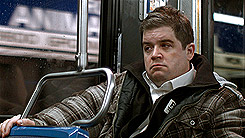 Patton Oswalt – skilled actor, whip-smart comedian, self-confessed cinephile geek, and obvious food lover – is fond of referring to his first starring vehicle as "Fatsy Driver." He's not far off. As written by first-time director Robert D. Siegel ("The Wrestler"), Stanton Island dwelling New York Giants superfan Aufiero is so dedicated to the success of his team that he refuses to sue or press charges after being severely beaten by a key player (Jonathan Hamm). He didn't spend all those hours on sports radio excoriating the rival Philadelphia Eagles just to have his team lose, serious injuries or no serious injuries. Indeed, while he's willing to forgive the Giants anything, his anger finds its focus on members of his family and even on his one and only friend (Kevin Corrigan). Ultimately, however, it's Aufiero's radio nemesis, Philadelphia Phil (Michael Rapaport), who becomes the target of his misdirected, and very possibly deadly, rage. Still, things might not turn out like we think. Like Travis, Aufiero may lash out, but the one sure victim is definitely himself. The fact that, on balance, "Big Fan" is almost a comedy has less to do with the number of laughs than a certain lingering gentleness in its antihero's tortured soul.
Patton Oswalt – skilled actor, whip-smart comedian, self-confessed cinephile geek, and obvious food lover – is fond of referring to his first starring vehicle as "Fatsy Driver." He's not far off. As written by first-time director Robert D. Siegel ("The Wrestler"), Stanton Island dwelling New York Giants superfan Aufiero is so dedicated to the success of his team that he refuses to sue or press charges after being severely beaten by a key player (Jonathan Hamm). He didn't spend all those hours on sports radio excoriating the rival Philadelphia Eagles just to have his team lose, serious injuries or no serious injuries. Indeed, while he's willing to forgive the Giants anything, his anger finds its focus on members of his family and even on his one and only friend (Kevin Corrigan). Ultimately, however, it's Aufiero's radio nemesis, Philadelphia Phil (Michael Rapaport), who becomes the target of his misdirected, and very possibly deadly, rage. Still, things might not turn out like we think. Like Travis, Aufiero may lash out, but the one sure victim is definitely himself. The fact that, on balance, "Big Fan" is almost a comedy has less to do with the number of laughs than a certain lingering gentleness in its antihero's tortured soul.
Ronnie Barnhardt of "Observe and Report" (2009)
 In his review, our own Jason Zingale argued that the situation of the mall cop gone very wrong portrayed by Seth Rogen in this deeply messed-up black comedy has more in common with Rupert Pupkin of "The King of Comedy" than the taxi driving Travis Bickle. He has a point. Whatever else is wrong with Bickle, he does seem to possess a rudimentary conscience and some small amount of compassion. Like Pupkin, however, Ronnie seems entirely lacking in any feeling whatever for his fellow humans, outside of a certain degree of cheap sentimentality that he learned from his promiscuous and otherwise 100% dysfunctional alcoholic mother (Celia Weston). Add to that an actual diagnosis of bipolar disorder and delusional ultra-violent fantasies of heroism and you've got a character that might well freak out half of the other guys in this feature. The highly controversial retroactively consensual sex scene between Rogen and co-star Anna Faris makes more sense when you look at the film that way, as does the fact that his character eventually becomes a hero to his community by shooting a nonviolent offender. That last thing, at least, is pure Bickle.
In his review, our own Jason Zingale argued that the situation of the mall cop gone very wrong portrayed by Seth Rogen in this deeply messed-up black comedy has more in common with Rupert Pupkin of "The King of Comedy" than the taxi driving Travis Bickle. He has a point. Whatever else is wrong with Bickle, he does seem to possess a rudimentary conscience and some small amount of compassion. Like Pupkin, however, Ronnie seems entirely lacking in any feeling whatever for his fellow humans, outside of a certain degree of cheap sentimentality that he learned from his promiscuous and otherwise 100% dysfunctional alcoholic mother (Celia Weston). Add to that an actual diagnosis of bipolar disorder and delusional ultra-violent fantasies of heroism and you've got a character that might well freak out half of the other guys in this feature. The highly controversial retroactively consensual sex scene between Rogen and co-star Anna Faris makes more sense when you look at the film that way, as does the fact that his character eventually becomes a hero to his community by shooting a nonviolent offender. That last thing, at least, is pure Bickle.
Arthur Poppington of "Defendor" and Dave Lizewski of "Kick-Ass" (2009/2010)
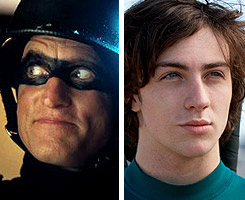 It's arguable that neither of these self-made, power-free un-superheroes from similarly premised but very different, and differently budgeted, dark comedies are actual sons of Travis Bickle. Maybe they're just nephews. True, they both have significant issues with the whole reality thing and some questionable motivations. At the same time, though, they're also both essentially goodhearted guys. Still, Martin Scorsese himself has compared Batman to Bickle and, if a non-super-powered but highly adept billionaire playboy putting on a bat costume and fighting crime may be slightly nuts, then an ordinary high schooler (Aaron Johnson of "Kick-Ass") and a borderline developmentally disabled construction worker (Woody Harrelson of "Defendor") who act in a similar fashion may qualify as batshit insane. In fact, a key part of the Travis Bickle mentality is the need to be, at least in one's own mind, "the good guy." In their own crazed way, Dave and Arthur are exposing the brighter side of what makes the "Taxi Driver" go. And, while dressing up like a superhero and trying to take out gangsters is an extremely bad idea if you're not actually born on the planet Krypton or blessed with the powers of a radioactive insect, Arthur/Defendor and Dave/Kick-Ass in a very funny way start to bend the "Taxi Driver" myth back towards the light.
It's arguable that neither of these self-made, power-free un-superheroes from similarly premised but very different, and differently budgeted, dark comedies are actual sons of Travis Bickle. Maybe they're just nephews. True, they both have significant issues with the whole reality thing and some questionable motivations. At the same time, though, they're also both essentially goodhearted guys. Still, Martin Scorsese himself has compared Batman to Bickle and, if a non-super-powered but highly adept billionaire playboy putting on a bat costume and fighting crime may be slightly nuts, then an ordinary high schooler (Aaron Johnson of "Kick-Ass") and a borderline developmentally disabled construction worker (Woody Harrelson of "Defendor") who act in a similar fashion may qualify as batshit insane. In fact, a key part of the Travis Bickle mentality is the need to be, at least in one's own mind, "the good guy." In their own crazed way, Dave and Arthur are exposing the brighter side of what makes the "Taxi Driver" go. And, while dressing up like a superhero and trying to take out gangsters is an extremely bad idea if you're not actually born on the planet Krypton or blessed with the powers of a radioactive insect, Arthur/Defendor and Dave/Kick-Ass in a very funny way start to bend the "Taxi Driver" myth back towards the light.
You can follow us on Twitter and Facebook for content updates. Also, sign up for our email list for weekly updates and check us out on Google+ as well.











